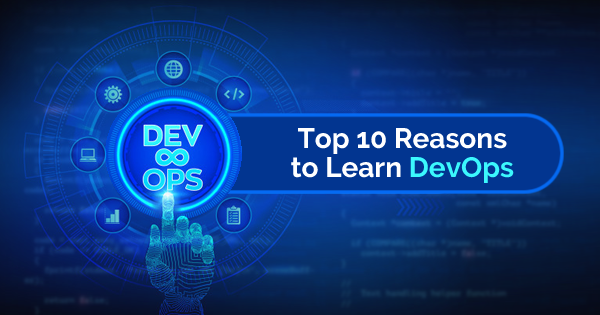DevOps has a bright and bright future. The practical use of DevOps is increasing each day. Let’s discuss what the future holds for DevOps across different sectors within the IT industry and where the most significant opportunities are. The demand for DevOps is well reflected in the salary of DevOps engineers in India. However, the pay is typically more for those who have DevOps capabilities and the most advanced PG in DevOps.
Contents
The Future and Trends of DevOps
1. DevOps are used in the Security Field.
The security area is unique because the more you automatize, the more chance you have of automatizing problems as well. This means that all automation in this field must be fully controlled, which opens up many possibilities for DevOps the concept.
Implementation of DevOps must guarantee the software’s security created in the production environment and even in testing environments. There are the guidelines and codes of conduct of the DevOps principle. DevOps must adhere to security procedures that guarantee that the application’s integrity is maintained and in line with the organization’s security guidelines.
2. AI/ML within the DevOps Framework
The software development lifecycle is transformed through the DevOps method cloud-native methodology, cloud-native approach, and microservices architecture. DevOps incorporates production and testing environments and allows developers to spot the issues before releasing applications.
Utilizing AI and ML in DevOps pipelines can allow you to build and automate your processes to a greater extent with greater insight and control. The trend is shifting from DevOps towards DataOps and AIOps that focus on using artificial machine learning and intelligence to gain insights from logs and monitoring metrics to help drive DevOps in a controlled manner.
Tools such as Moogsoft or BigPanda are market leaders in AIOps, which collect information from various monitors and log systems. Then apply artificial intelligence to it, and provide engineers with more in-depth insight and actionable information.
3. Automation for Every Business
Today all things happen on the internet. The majority of companies are evolving to become IT-based company that offers specific services. For instance, booking.com was a travel business that now operates as an IT-based company that provides travel services.
Every company’s software is the essential component that drives sales and business. Therefore, automatizing software deployment and infrastructure provisioning are crucial to modern-day companies. It plays a critical role in increasing efficiency and helping to roll out the top software. DevOps techniques have a vital role to play in the modern-day business world.
4. Container Technology
The technology of containers is changing and growing faster than ever previously. Containers can be utilized in a variety of ways to offer various advantages. They can also be utilized to create sandbox software to ensure security and resource limitations. Researchers are conducting research using containers for users or per session.
This concept offers a wide variety of possibilities to improve security for users, system security and security of the system security, and analyze user behavior. As technology for containerization improves and containers become more affordable to use.
5. Platform as a Service (PaaS)
Platform as a Service (PaaS) is a rapidly growing field that offers many potential applications for DevOps concepts. There is no longer a time when people have to worry about creating an entire infrastructure for their application. Nowadays, they only need the platform their applications will be hosted.
DevOps offers a variety of potential applications for providing PaaS solutions that include configuration management, continuous security, and containerization. Shortly, technology could be improved, so developers only need to establish a couple of markers or entry points within their applications. This is all required for an application to be hosted or distributed on its own.
6. DevOps and a Focus on Integration Between Edge Services
The old model of hosting on-premises is shifting. In the past couple of years, businesses have switched toward Infrastructure as a service (IaaS), Database as a Service (DBaaS) as well as Platform as a Service (Paas) solutions. With cloud technology advancing massively and containerization technologies becoming all over the place, DevOps has to play an integral part in the deployment of the services hosted on various platforms.
Public clouds are growing in popularity and acceptance. nowadays, even traditional enterprises are shifting to cloud-based services due to the savings in cost that cloud-based solutions can provide. Many companies are now considering using tools for managing configurations along with container technology to completely automate infrastructure provisioning and administration. This will ensure a bright outlook for DevOps.
7. DevOps Can Play a Part In Seamless Security Integration
The majority of security attacks are due to weakness at an application level. Companies are currently seeking to adopt an established as well as secure development strategy that allows them to stay away from all these threats. The industry is currently moving to a programmatic approach to application security that incorporates security into the very beginning of the development of the software development life cycle.
The companies require implementing a security approach that goes far beyond simply scanning and fixing security weaknesses. DevOps could play an essential role in this. DevOps can enable seamless security integration through the continuous security approach that allows development teams to create secure software quicker than ever before. DevOps ongoing security assures that testing is conducted throughout the development cycle rather than at the close.
So programmers will have the ability to spot code flaws in the development phase and ensure security that the application is secure before the formal testing phase.
8. Job as an Act of Code
The development-to-operations handshake is still a manual and tedious process. It is anticipated that the DevOps approach will emphasize “jobs-as-code” within the lifecycle of software delivery. This can be used as instrumentation for coding automation. This method with the Infrastructure as a Code methodology and CI/CD pipelines will help reduce the time gap for the development-to-operations handshake.
9. Containers will override Configuration Management
In 2019 this year, container orchestration systems are reshaping the field of DevOps. Container orchestration techniques are so effective that they can replace tools for managing configurations like Ansible Chef, Ansible, or Puppet.
Kubernetes is currently the most well-known and most extensively utilized container orchestration system. However, there are many more still to be released into the market. If implemented correctly, container orchestration systems will simplify the infrastructure provisioning process and some of its complexity.
The DevOps world will need to adopt this new approach known as Infrastructure as Code. In addition, the industry is expected to work towards standardizing the frameworks used for software versions, reducing the requirement for software configurations. For instance, companies can offer different docker images from the software, with different designs based on customers’ needs. Therefore, the requirement for tools for managing configurations will be reduced.
Conclusion
What’s to come from DevOps is highly promising, and many businesses are preparing to adopt this method of operation. DevOps techniques are also evolving with the advent of new tools and technologies. We hope that through this piece, we’ve talked about ideas regarding DevOps future direction and how it can be used to transform the industry even more.





































